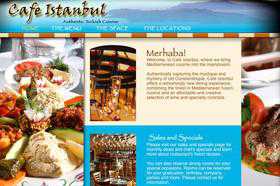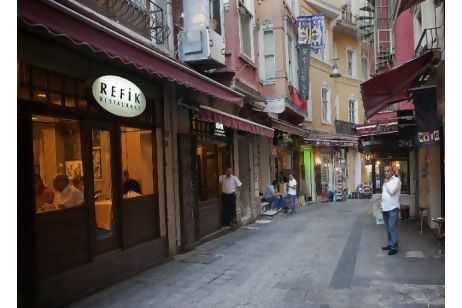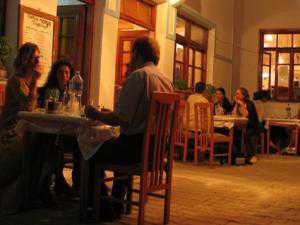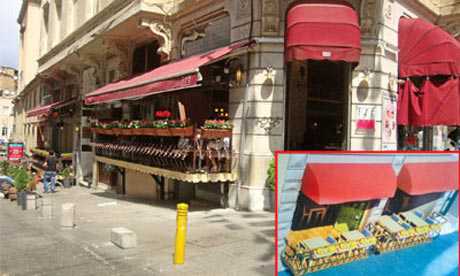By LIESL SCHILLINGER
SOMETIMES I think it’s no accident that Istanbul’s telephone area code is 212. Despite its minarets and its hilly cobblestone streets, its Grand Bazaar and the sapphire waters of the Bosporus that glide through the city like a liquid sash, this eastern metropolis has a New York state of mind.
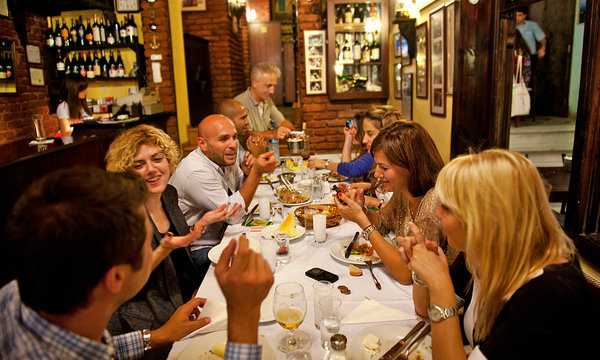
A table at Asmali Cavit, which specializes in small plates.
You feel purposeful energy humming in the air as you watch the inhabitants stroll through the maze of streets and lanes, arm in arm. You sense their conviction that the city has been designed for their pleasure; that if they can make it here, they’ll make it anywhere. Sometimes they’re headed to experimental music concerts, gallery openings or simply the office. But very often, they’re bound for cafes, meyhanes (think of them as Turkish tapas bars, serving small plates, wine, beer and raki) or any of the countless restaurants that edge the waterfront and sidewalks.
Visitors to Istanbul can find it bewildering to decide where to eat. On my first trip there, in 2004, I was squired around town by a friend and his Turkish wife on a culinary Magical Mystery Tour that unspooled like a delicious dream. But on this visit (my fourth), I wandered with the intention of passing along the names of five spots sure to please epicurean newcomers — bearing in mind that couples, thrill seekers and purists have different gustatory goals. But everyone will want a tip for the best meyhane, so that’s where I began.
Asmali Cavit
When I’m in the mood for mezes, I usually grab a table at the always-thronged meyhanes Refik or Sofyali 9, which bob amid a torrent of other meyhanes on Sofyali Sokak, in Beyoglu, near Tunel Square. But on my most recent visit, my Turkish friend Mehmet Murat Somer, author of “The Kiss Murder” and other mysteries, insisted I try Cavit, on Asmalimescit Caddesi, just around the corner. A few bites into the chargrilled borek meat pastry (other meyhanes tend to fry them), I saw why. The flaky phyllo crust was marvelously crisp against the juicy meat and sautéed onions inside.
You don’t necessarily go to a meyhane for great food; a bonhomous atmosphere matters more. But Cavit offers both. From the street, it resembles a snug, wood-faced Alpine chalet, but seems to magically expand as you walk in. On a damp, cool night earlier this year, the second-floor dining room was packed to the (exposed) rafters. Murat, as he is known, waved me to a corner table where he and a lively entourage were already carousing, and called for a bottle of raki as a fleet of well-crafted standards began sailing onto the table: patlican salatasi (smoky, roasted eggplant purée with béchamel), tender braised squid, and lakerda — rose-beige petals of cured Black Sea tunny.
We delved into the house specialty, topik, a sweet and savory Armenian chickpea dish that has the smooth-grained, dense texture of halvah. Dotted with raisins and tahini, it melted on the tongue. Piping hot sardines arrived next. Each morsel was made of two silver fillets, placed back-to-back and grilled. On the plate, they resembled shimmering butterflies. We spritzed them with lemon and snapped them up, skins and all.
Asmali Cavit, Asmalimescit Caddesi No. 16/D, Beyoglu; (90-212) 292-4950; 70 Turkish lira, or about $40 at 1.80 lira to the dollar for a generous assortment for two, without drinks or tip.
Agatha, Pera Palace Hotel
Last spring, Yigal Schleifer (who has contributed to The Times Travel section) and Ansel Mullins, American expats who created the blog Istanbul Eats, fielded an online question from a diner: “Can you please help my clueless boyfriend (along with millions of Turkish men) find a nice and romantic place to propose?” They cagily did not reveal the place that Mr. Mullins himself chose when he popped the question to his wife a decade ago: Pera Palace, the grand Ottoman Victorian hotel where Agatha Christie is said to have written “Murder on the Orient Express.” Back then, Pera Palace was picturesquely rundown. But last year, it emerged from a meticulous restoration with the elegant addition of a downstairs restaurant called Agatha, which exudes belle époque glamour. As you descend a white marble staircase to the chandeliered dining room, you see, in a glass window case, shining pieces of 1892 Christofle silver, and in another case, a New Year’s Eve menu from 1924, offering “frivolités madrilènes.”
In 2011, Agatha may well offer Istanbul’s most stately gourmet experience. Each month, the German-born executive chef, Maximilian Thomae, devises a tasting menu inspired by a Turkish staple. One recent theme was olive oils, drawn from 60 orchards; a different variety flavored each dish. His vegetable mosaic terrine resembled a French knot garden, bordered in chard, paved with sumac-spiced rice and pebbled with carrot and zucchini. The citrusy oil he chose — Laleli Taylieli Extra Virgin — united the whole. He steeped his house-cured salmon in jasmine tea, and his velvety, tangy vine-leaves soup was balanced by crab dumplings — fluffy round soufflés the size of cherries, which arrived on their own side dish to be admired before being tumbled into their flavorful bath. He tenderized the quail kebab in milk and encased it in a beguiling peach pestil. As I marveled at these harmonies of texture and taste, I hunted for the Turkish clues lurking in each dish. Even the sorbet, silky smooth, made of limes and olive oil, was redolent of Turkey’s hillsides.
Agatha, Pera Palace Hotel, Mesrutiyet Caddesi 52, Tepebasi, Beyoglu; (90-212) 377-4000; perapalace.com. Chef’s Degustation Menu (recommended), 125 lira per person without wine.
Munferit
Scenesters who come to Istanbul in search of fascinating strangers head for Munferit, right off the bustling Istiklal pedestrian mall. Here Turkish and global gadabouts gather to drink Ferit Sarper’s thrice-distilled Beylerbeyi raki, made from grapes and anise at his family’s distillery in western Turkey, and to sample his stylish menu, notably the smoky fried eggplant with tahini, and the black couscous in squid ink, sprigged with magenta blossoms of grilled calamari. Main courses include chargrilled lamb chops with endive, and lettuce-wrapped sea bass with fennel. For a rustic touch, Mr. Sarper ships in crusty bread twice a week, baked in a village stove in his home province and served with a molten dollop of anchovy butter.
On weekdays, diners romance each other across candlelit tables that line the narrow terrace adjoining Munferit’s main dining room; but on weekends, Mr. Sarper D.J.’s, manning the laptop at the bar. As the music swells, a fashionable, fun-seeking crowd, redolent of Los Angeles and Moscow, fills the terrace, and the staff whisks away the tables, one by one, until the restaurant has transformed itself into a dance party. As I left on a Friday after midnight, the lyric “I’m in with the in crowd” surged from the speakers — it could be Munferit’s theme song.
Munferit, Firuzaga Mahallesi, Yeni Carsi Caddesi No. 19, Beyoglu; (90-212) 252-5067; munferit.com.tr; about 140 lira for an average meal for two, without drinks or tip.
Sehzade Erzurum Cag Kebabi
At heart, Turkish cuisine is not fussy; it’s unpretentious, locavore home cooking. Grown men in Istanbul routinely have their mothers bus them homemade meals from the provinces. At Sehzade Erzurum Cag Kebabi, a thrillingly authentic hole-in-the-wall near the Egyptian market, I perched on a plastic chair and lunched on an “extremely important kebab” with Mr. Mullins (who willingly travels an hour and a half to taste “the best bean in Istanbul”).
The lamb at Sehzade roasts on a horizontal spit, which maximizes its juiciness. Ozcan Yildirim, the usta (master chef), beamed at us from his grill, leaned around the doorway and proudly thrust a skewer of lamb toward my lips, coaxing me to pull the meat off with my teeth. His lambs had grazed on thyme and wildflowers in the mountains, he boasted. “Taste, taste!” he insisted. Instead, I used a pillow-soft sheet of doughy white lavash bread to gather up the delectable meat, and ate it with tomato-and-cucumber shepherd’s salad, and thick, lemony buffalo-milk yogurt.
Sehzade Erzurum Cag Kebabi, Hocapasa Sokak 3/A, Sirkeci; (90-212) 520-3361; 15 lira prix fixe.
Akdeniz Hatay Sofrasi
For a broader menu and a more elaborate gustatory spectacle, I took the tram with a Turkish friend and journeyed past the Grand Bazaar to a flower-garlanded restaurant called Hatay Sofrasi, which delivers the aromatic specialties of Turkey’s Hatay province, situated along the Mediterranean and the Syrian border. Waiters in white jackets and fezzes ushered us upstairs, where we took a table among a genteel crowd of bureaucrats and their wives.
Delicacies arrived in rapid succession: a tinglingly fresh salad of oregano leaves, confettied with red strips of tomato and green olives; a succulent dome of firik pilav — pearly cracked wheat dotted with braised lamb; and fried pastry torpedoes called oruk haslama, stuffed with spicy ground meat, walnuts and chiles. Glasses of rosewater and freshly squeezed orange-and-pomegranate juice cooled our palates, and soon a waiter emerged, bearing a triumphal platter that held a meter-long beef and lamb kebab, bejeweled with pine nuts, pomegranate pips and parsley. We tore off hanks of flatbread to enfold sandwich-size sections of kebab, spooning in muhammara (a creamy dip made of red peppers and walnuts) and barbecued eggplant purée for added savor. Another waiter wheeled in a cart topped with a rock-salt igloo, which he set alight. He then smashed the flaming salt crust with a mallet and unveiled a whole roasted chicken that was stuffed with cardamom-spiced rice and exhaled fragrant steam.
We could not resist a cool rectangle of the traditional Hatay candied pumpkin dessert, crisp and crunchy on the outside, fruity and jellied within; and the authentic walnut dessert: walnuts in the shell, softened in lime, and boiled in syrup until they could be cut with a butter knife, even the shells.
Akdeniz Hatay Sofrasi, Ahmediye Caddesi 44A, Fatih, Aksaray; (90-212) 531-3333; akdenizhataysofrasi.com.tr; about 100 lira for a generous meal for two, not including tip. No alcohol.


